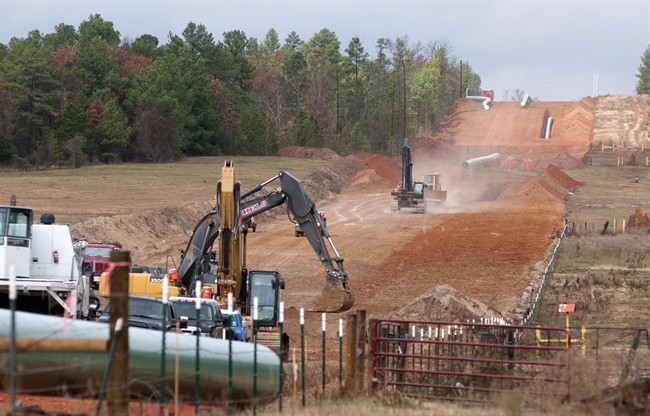WASHINGTON – With TransCanada’s Keystone XL pipeline dominating environmental debate in the United States, efforts by America’s struggling coal industry to boost coal exports to Asia have flown largely under the public’s radar.

Freight trains almost two kilometres long are already hauling coal from Montana and Wyoming to the Pacific Northwest, where it’s then shipped to energy-hungry Asian nations that have few qualms about burning the maligned fossil fuel.
The $40-billion U.S. coal industry is hoping to ship even more coal to Asia depending on the fate of three more coal export terminals proposed for Oregon and Washington state. The industry has been reeling in the face of a steep decline in domestic coal consumption caused by both an abundance of cheaper natural gas and increasingly strict federal environmental regulations.
“For every million tons of U.S. coal exported, an estimated 1,320 total jobs are added to the U.S. economy,” Hal Quinn, president of the National Mining Association, told a recent congressional hearing into energy and power as he made a pitch for approval of the terminals.
“These high-wage jobs pay nearly 50 per cent more than the national average in wages. The direct jobs created from coal exports average approximately $96,100 annually in total wages and benefits, a rare example of new high-wage job creation in an economy still struggling to create good employment opportunities.”
Quinn even praised Stephen Harper in his testimony to U.S. lawmakers, saying the Canadian prime minister’s so-called “one project, one review” initiative aimed at streamlining the permit process for new industrial projects provides “greater certainty, reliability and efficiency.”
But exporting American coal overseas is an undertaking with the potential to result in a far greater increase in global greenhouse gas emissions than Alberta’s oilsands and the Keystone XL pipeline.
Greenpeace, in fact, ranked efforts to increase U.S. coal exports to Asia by as much as 190 million tonnes a year as the third most harmful project in the world in terms of carbon emissions. Alberta’s oilsands ranked fifth.

Get breaking National news
“This would add 420 million tonnes of CO2 a year to global emissions before 2020; more than the entire CO2 emissions from fossil fuels in Brazil in 2010,” the January report found.
READ MORE: Open Data: Alberta oil spills 1975-2013
The story has a Canadian angle, with U.S. coal manufacturers dealt a blow last month when Metro Vancouver’s board nixed a proposed new coal export terminal in Surrey, B.C. Port Metro Vancouver is already the No. 2 coal exporter in North America, and American coal producers were hoping to gain further access to Asian markets via Surrey.
Members of the board voted 21-4 to oppose the terminal, where American thermal coal would have been reloaded from trains to barges for shipment to Asia. Twenty-five Canadian jobs would have been created by the proposed $15 milliion terminal.
The arguments made against the terminal by Burnaby Mayor Derek Corrigan were remarkably similar to the ones made against Keystone XL by American opponents of the pipeline.
“I’m not an opponent of the coal industry in Canada,” Corrigan said.
“But the issue is taking coal from the United States – bad coal, the most difficult coal, the cheapest coal – bringing it into Canada, processing it twice through our ports, taking all of the environmental risks for none of the real benefits, and in the end of it we get 25 jobs.”
Keystone XL would transport millions of barrels a week of carbon-intensive Alberta oilsands bitumen through six U.S. states to refineries on the Gulf Coast. Pipeline foes accuse its proponents of wildly exaggerating their job creation claims; the U.S. State Department says only 35 permanent jobs would result from the pipeline.
Environmental groups on both sides of the border have recently been stepping up their efforts to fight the coal export terminals.
Environmentalists and some elected officials have called on the Obama administration to look at the cumulative impact of hauling millions of tonnes of coal via rail to the Pacific Northwest. They’ve raised concerns about increased pollution from coal dust and traffic congestion in addition to the bigger climate change impact of exporting a fossil fuel destined for burning overseas.
The Sierra Fund and other green groups filed suit in a federal court in Seattle last month against a railway and several coal producers, alleging that coal dust emanating from passing trains is polluting lakes and rivers in Washington.
The coal industry, meantime, is pushing hard for the new ports, arguing they’ll create jobs in a region of the country that’s struggling economically. Coal industry officials have also insisted that a sweeping environmental analysis of the export terminals – something demanded by environmental groups – would hold coal to a different standard than other commodities shipped from West Coast ports, including wheat and lumber.
Despite the Surrey setback, there was some good news for coal producers in recent weeks when the U.S. Army Corps of Engineers – the federal agency that oversees the country’s public works – said it had no plans to review the broader climate-change impacts of the proposed facilities in Oregon and Washington state.
“The Corps will limit its focus on emissions to those associated with construction of the facilities,” Jennifer Moyer, acting regulatory chief for the Corps, told lawmakers during the subcommittee hearing.
“The effects of burning of coal in Asia, or wherever it may be, is too far to affect our action.”
Democrat Henry Waxman, the biggest climate hawk in the U.S. House of Representatives, chided the agency for its decision.
“I think the Corps is making a big mistake,” he told Moyer.
But the Republican chairman of the subcommittee, Ed Whitfield, went to bat for the coal export terminals.
“It will help decrease our trade deficit; it will help increase the number of jobs in America,” said the Kentucky congressman, whose state is one of the country’s top coal producers.
Overseas markets present a “tremendous opportunity” for U.S. coal, he added.





Comments